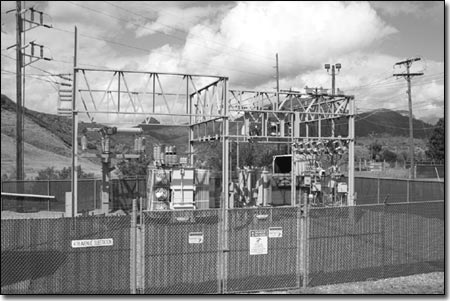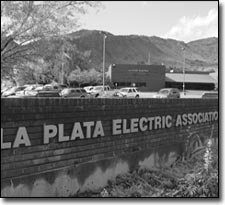|
 |
| Generating substations, like this, could
begin to give way to ones that relay renewable energy from
sources like wind
and sun if Amendment 37, a statewide ballot initiative, passes
Nov. 2. The amendment would require that at least 10
percent of electricity provided by large utilities comes from
renewable sources./Photo by Todd Newcomer. |
Renewable energy promises to be one of the hottest items on the Nov.
2 ballot. Proponents are already clashing with utilities
and electrical cooperatives on Amendment 37, a statewide ballot question
on whether to require utilities to supply a portion of their power from
renewable sources. Meanwhile, a war of words and advertising dollars
is shaping up for the weeks leading up to the election.
If Amendment 37 passes, utility suppliers serving 40,000 customers
or more would be required to provide at least 10 percent of power from
renewable sources. The primary source would be wind power, because it
is currently the most cost effective, and the companies would have until
2015 to come into compliance. Currently, only about 2 percent of Colorado's
power comes from renewable sources. Renewable energy has landed on the
ballot largely because of the failure of the Colorado State Legislature
to enact similar standards. Three separate attempts in three years were
voted down.
 |
| La Plata Electric Association
is one of many utilities and cooperatives that
are opposing Amendment 37. The groups argue that
the plan is ill-conceived and will result in higher
electricity bills, and they are undertaking a major
advertising campaign against the measure./Photo
by Todd Newcomer. |
Mark Stetz, vice-chair of the Southwest Colorado Renewable Energy Society,
explained, “There were three attempts in the last three years to get
a renewable energy standard in the state Legislature and they were all
scuttled. Fifteen other states in the country already have these kinds
of standards, including that bastion of liberal ideology, Texas.”
Stetz added that Amendment 37 reflects a shift toward a desire for
cleaner, more economical power sources. With three separate failures
in the Legislature, Stetz said that getting Amendment 37 on the ballot
was a way to get conservative utilities to explore new models.
“It's a way of pushing them away from the current habits and getting
them to be more progressive,” he said. “The utilities don't seem to
want to do this on their own. This is a way of pushing them into the
20th century.”
Proponents of the question have numerous arguments in favor of encouraging
renewable energy. On the one hand, there are the obvious environmental
pluses of such a measure. On the other, proponents charged that moving
toward renewable energy will actually mean cheaper bills (see sidebar).
“Wind power is a fixed-price commodity,” Stetz said. “It doesn't fluctuate,
but it does have a high set-up cost. As time goes on, fossil fuel prices
should continue to increase and wind power should continue to come down.”
Stetz added that Amendment 37 could offer visible benefits to the Four
Corners region.
“Very simply, we're in the airshed of many coal-fired power plants,” he
said. “Any added emissions, from existing plants or the several new
ones that are proposed, end up in our air. I don't expect that La Plata
or Archuleta counties would be on the power generation side of this,
but we would benefit from decreased dependence on coal-fired power.”
The cost of renewable energy
Colorado's renewable-energy ballot measure will
most likely have no significant effect on electricity
bills, according to a recent analysis.
Ron Binz, president of Public Policy Consulting
and formerly Colorado's utility consumer advocate,
said Amendment 37 will probably cause electric
utility bills to drop about one cent a month
per household, or $14 million, between 2005 and
2024.
“The renewable measure's impact on consumer's
bills will probably be unnoticeable,” Binz said. “Most
likely, statewide rates will be virtually unchanged.”
Binz added that utilities that will see little
effect on their prices include Xcel Energy and
Colorado Springs Utilities. Customers of Intermountain
REA will probably pay 45 cents less each month,
according to the study. Six rural electric cooperatives,
including La Plata Electric Association, may
see modest increases. However, Binz added that
they can be avoided depending on the strategy
used by the supplier, TriState.
The study was funded by the Energy Foundation,
a partnership of major foundations interested
in sustainable energy.
– Will
Sands |
Residents of other counties also have seen the upside of renewable
energy, according to Coloradans for Clean Energy, the group that organized
the push to get Amendment 37 on the ballot. The group's polling reports
as high as 75 percent voter approval of the ballot measure.
“It's looking really good,” said Manolo Gonzalez-Estay, the group's
campaign coordinator. “Colorado voters are realizing that clean air
and cheaper energy are good things for them.”
While Gonzalez-Estay argued that the measure has grassroots support,
he also admitted that it faces daunting opposition from the companies
and cooperatives that would have to meet the new standards. Xcel Energy,
the state's largest utility, Intermountain REA, the third largest utility,
and TriState Generation and Transmission Company, the supplier of six
rural electric cooperatives, have all actively opposed Amendment 37.
4
“That's primarily the only opposition,” said Manolo-Estay. “The only
people that have invested money into defeating this are utilities.”
Amendment 37 also has drawn opposition from La Plata Electric Association,
the Durango area's electrical cooperative. On Aug. 30, the LPEA Board
of Directors voted to oppose the initiative, saying it was ill conceived.
They also appropriated $3,100 of co-op funding to advertising aimed
at defeating the measure.
“It leaves too many unanswered questions,” said LPEA spokesman David
Waller. “We don't know how it's going to turn out. The amendment authors
said they wanted to treat co-ops differently, but that language didn't
make it onto the ballot.”
Waller emphasized that the board is in no way opposed to renewable
energy, saying, “We want to stress, again and again and again, that
we're 100 percent in favor of renewable energy, and we continue to grow
our green power program. We just don't think this is the way.”
Waller concluded by saying that renewable energy is not an absolute
solution. “The wind doesn't always blow,” he said. “The sun doesn't
always shine. We're still going to have to have coal plants and natural
gas plants to cover those times.”
While LPEA has appropriated $3,100 to fight Amendment 37, Coloradans
for Clean Energy reported that Xcel Energy is prepared to spend up to
$10 million to turn the vote. Mark Stutz, spokesman for the utility,
quotes a smaller number, noting that its group, Citizens for Sensible
Energy Choices, has raised $560,000 and “Xcel will give substantially
more to the effort.”
Like Waller, Stutz noted that Xcel is not against renewable energy,
commenting that the company supported the last two efforts to move standards
through the Legislature. However, like Waller, he also said that the
new measure is poorly crafted.
“One issue Amendment 37 doesn't seem to care about is how much it is
actually going to cost,” Stutz said. “The big thing you can't make an
assumption about is federal tax breaks. Xcel Energy is looking to triple
the amount of wind power we have by 2006. We propose a plan where we'll
build our wind when the tax credits come back into place.”
Stutz noted that under the current Administration, federal tax credits
are not offered for the construction of wind farms. Those credits amount
to tens of millions of dollars, he said. Should voters pass Amendment
37, that expense, along with approximately $6 million in annual operating
expenses, would find its way onto utility bills.
“At the end of the day, we're the ones who send the bill to 1.2 million
customers and have to deal with their reactions,” he said.
However, even with the full advertising assault that is planned for
coming weeks, Stutz said that he fears that voters have made up their
minds.
“It's frustrating for us because when people go to the ballot box,
of course they're going to vote for renewable energy,” he said.
Gonzales-Estay, of Coloradans for Clean Energy, is making a similar
bet. “The passage of this is going to be very significant,” he said
with confidence. “We will be the first state in the nation that will
pass such an issue by a vote of the people.”
|